Environmental Sustainability in Tourism and Hospitality Sector Report
VerifiedAdded on 2022/10/10
|10
|2184
|19
Report
AI Summary
This report delves into the crucial role of environmental management within the tourism and hospitality sector. It examines the benefits of sustainable practices, such as cost reduction, improved brand reputation, and environmental conservation. The report highlights the significance of the housekeeping department in implementing green cleaning policies, detailing the use of eco-friendly products and waste management. It further analyzes guest expectations regarding cleanliness, hygiene, and the adoption of sustainable practices by hotels. The study underscores the positive impacts of environmental management on the sector, while also acknowledging the challenges and the importance of sustainable development for a better future. The report concludes that environmental management is not just a trend but a necessity for the long-term viability and success of the tourism and hospitality industry, emphasizing the need for continuous efforts to protect the environment and meet evolving guest expectations.
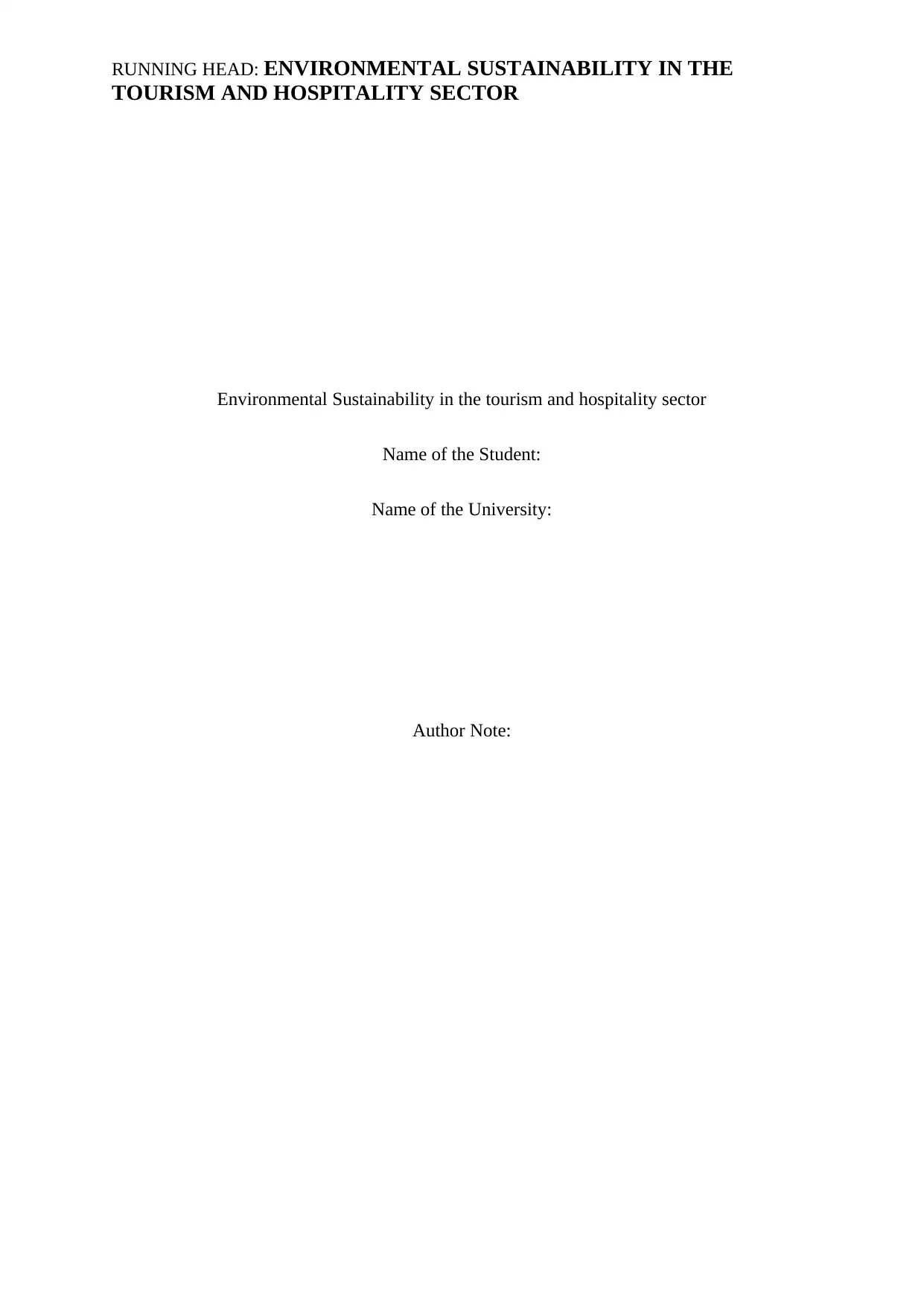
RUNNING HEAD: ENVIRONMENTAL SUSTAINABILITY IN THE
TOURISM AND HOSPITALITY SECTOR
Environmental Sustainability in the tourism and hospitality sector
Name of the Student:
Name of the University:
Author Note:
TOURISM AND HOSPITALITY SECTOR
Environmental Sustainability in the tourism and hospitality sector
Name of the Student:
Name of the University:
Author Note:
Paraphrase This Document
Need a fresh take? Get an instant paraphrase of this document with our AI Paraphraser
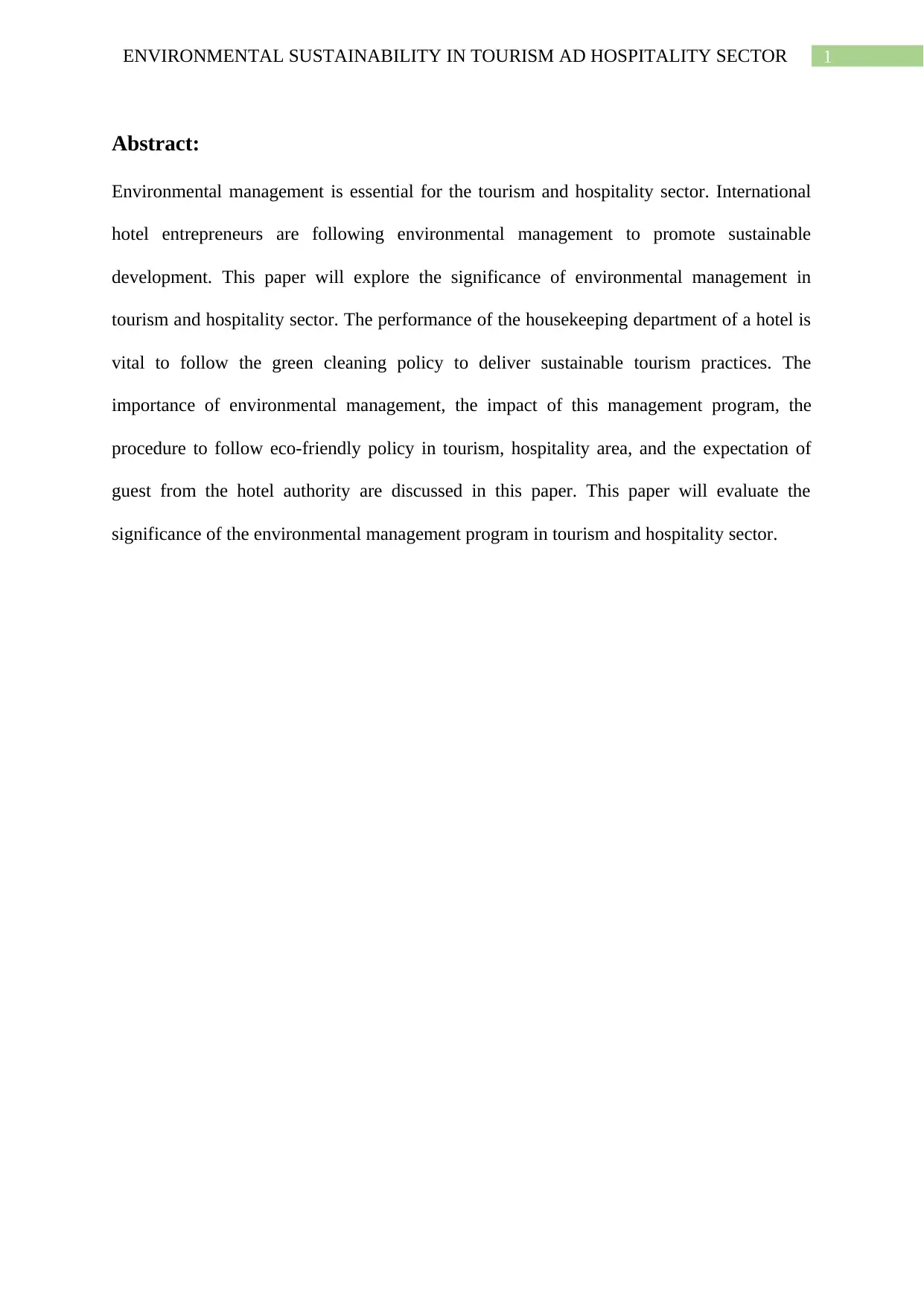
1ENVIRONMENTAL SUSTAINABILITY IN TOURISM AD HOSPITALITY SECTOR
Abstract:
Environmental management is essential for the tourism and hospitality sector. International
hotel entrepreneurs are following environmental management to promote sustainable
development. This paper will explore the significance of environmental management in
tourism and hospitality sector. The performance of the housekeeping department of a hotel is
vital to follow the green cleaning policy to deliver sustainable tourism practices. The
importance of environmental management, the impact of this management program, the
procedure to follow eco-friendly policy in tourism, hospitality area, and the expectation of
guest from the hotel authority are discussed in this paper. This paper will evaluate the
significance of the environmental management program in tourism and hospitality sector.
Abstract:
Environmental management is essential for the tourism and hospitality sector. International
hotel entrepreneurs are following environmental management to promote sustainable
development. This paper will explore the significance of environmental management in
tourism and hospitality sector. The performance of the housekeeping department of a hotel is
vital to follow the green cleaning policy to deliver sustainable tourism practices. The
importance of environmental management, the impact of this management program, the
procedure to follow eco-friendly policy in tourism, hospitality area, and the expectation of
guest from the hotel authority are discussed in this paper. This paper will evaluate the
significance of the environmental management program in tourism and hospitality sector.
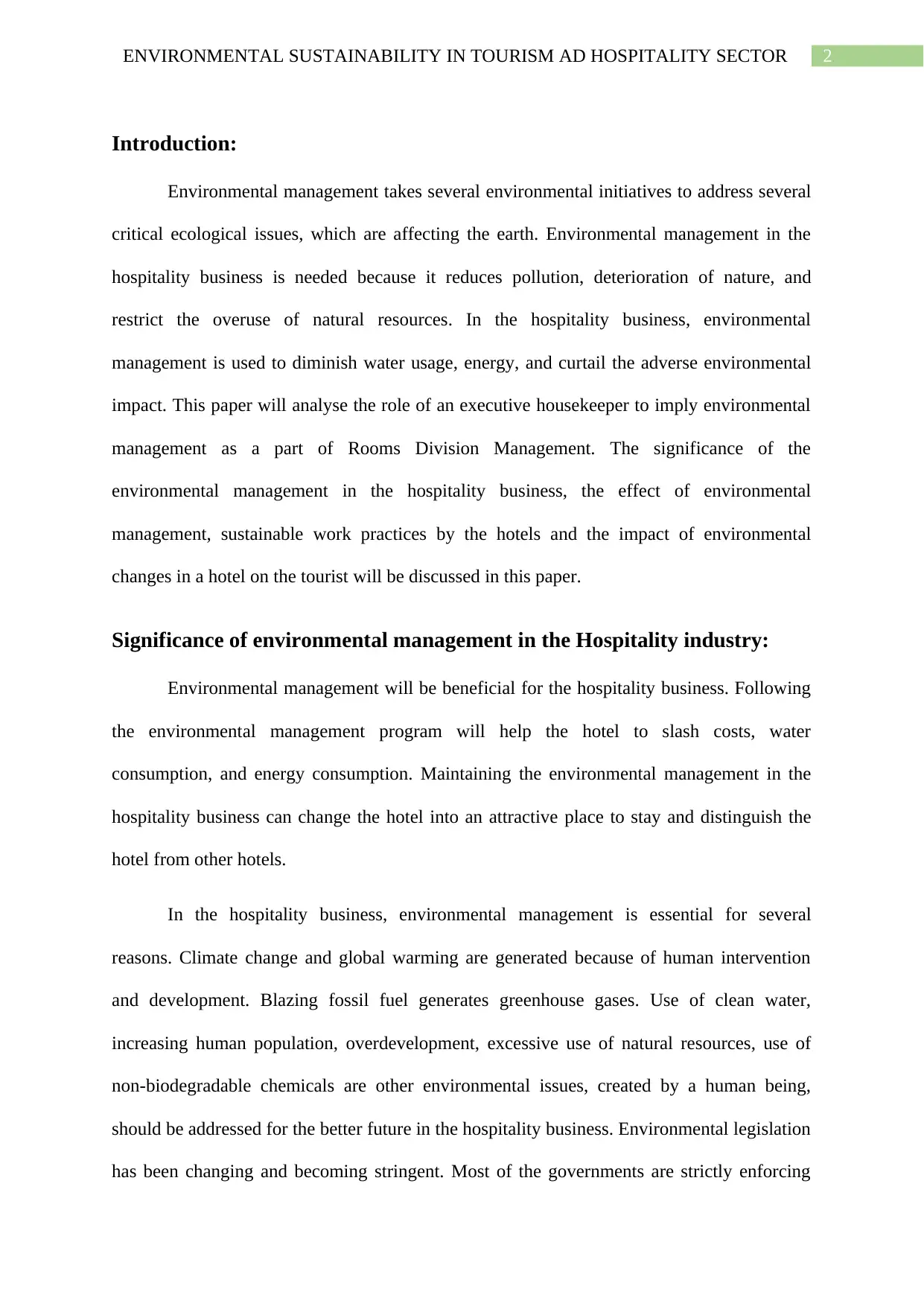
2ENVIRONMENTAL SUSTAINABILITY IN TOURISM AD HOSPITALITY SECTOR
Introduction:
Environmental management takes several environmental initiatives to address several
critical ecological issues, which are affecting the earth. Environmental management in the
hospitality business is needed because it reduces pollution, deterioration of nature, and
restrict the overuse of natural resources. In the hospitality business, environmental
management is used to diminish water usage, energy, and curtail the adverse environmental
impact. This paper will analyse the role of an executive housekeeper to imply environmental
management as a part of Rooms Division Management. The significance of the
environmental management in the hospitality business, the effect of environmental
management, sustainable work practices by the hotels and the impact of environmental
changes in a hotel on the tourist will be discussed in this paper.
Significance of environmental management in the Hospitality industry:
Environmental management will be beneficial for the hospitality business. Following
the environmental management program will help the hotel to slash costs, water
consumption, and energy consumption. Maintaining the environmental management in the
hospitality business can change the hotel into an attractive place to stay and distinguish the
hotel from other hotels.
In the hospitality business, environmental management is essential for several
reasons. Climate change and global warming are generated because of human intervention
and development. Blazing fossil fuel generates greenhouse gases. Use of clean water,
increasing human population, overdevelopment, excessive use of natural resources, use of
non-biodegradable chemicals are other environmental issues, created by a human being,
should be addressed for the better future in the hospitality business. Environmental legislation
has been changing and becoming stringent. Most of the governments are strictly enforcing
Introduction:
Environmental management takes several environmental initiatives to address several
critical ecological issues, which are affecting the earth. Environmental management in the
hospitality business is needed because it reduces pollution, deterioration of nature, and
restrict the overuse of natural resources. In the hospitality business, environmental
management is used to diminish water usage, energy, and curtail the adverse environmental
impact. This paper will analyse the role of an executive housekeeper to imply environmental
management as a part of Rooms Division Management. The significance of the
environmental management in the hospitality business, the effect of environmental
management, sustainable work practices by the hotels and the impact of environmental
changes in a hotel on the tourist will be discussed in this paper.
Significance of environmental management in the Hospitality industry:
Environmental management will be beneficial for the hospitality business. Following
the environmental management program will help the hotel to slash costs, water
consumption, and energy consumption. Maintaining the environmental management in the
hospitality business can change the hotel into an attractive place to stay and distinguish the
hotel from other hotels.
In the hospitality business, environmental management is essential for several
reasons. Climate change and global warming are generated because of human intervention
and development. Blazing fossil fuel generates greenhouse gases. Use of clean water,
increasing human population, overdevelopment, excessive use of natural resources, use of
non-biodegradable chemicals are other environmental issues, created by a human being,
should be addressed for the better future in the hospitality business. Environmental legislation
has been changing and becoming stringent. Most of the governments are strictly enforcing
⊘ This is a preview!⊘
Do you want full access?
Subscribe today to unlock all pages.

Trusted by 1+ million students worldwide
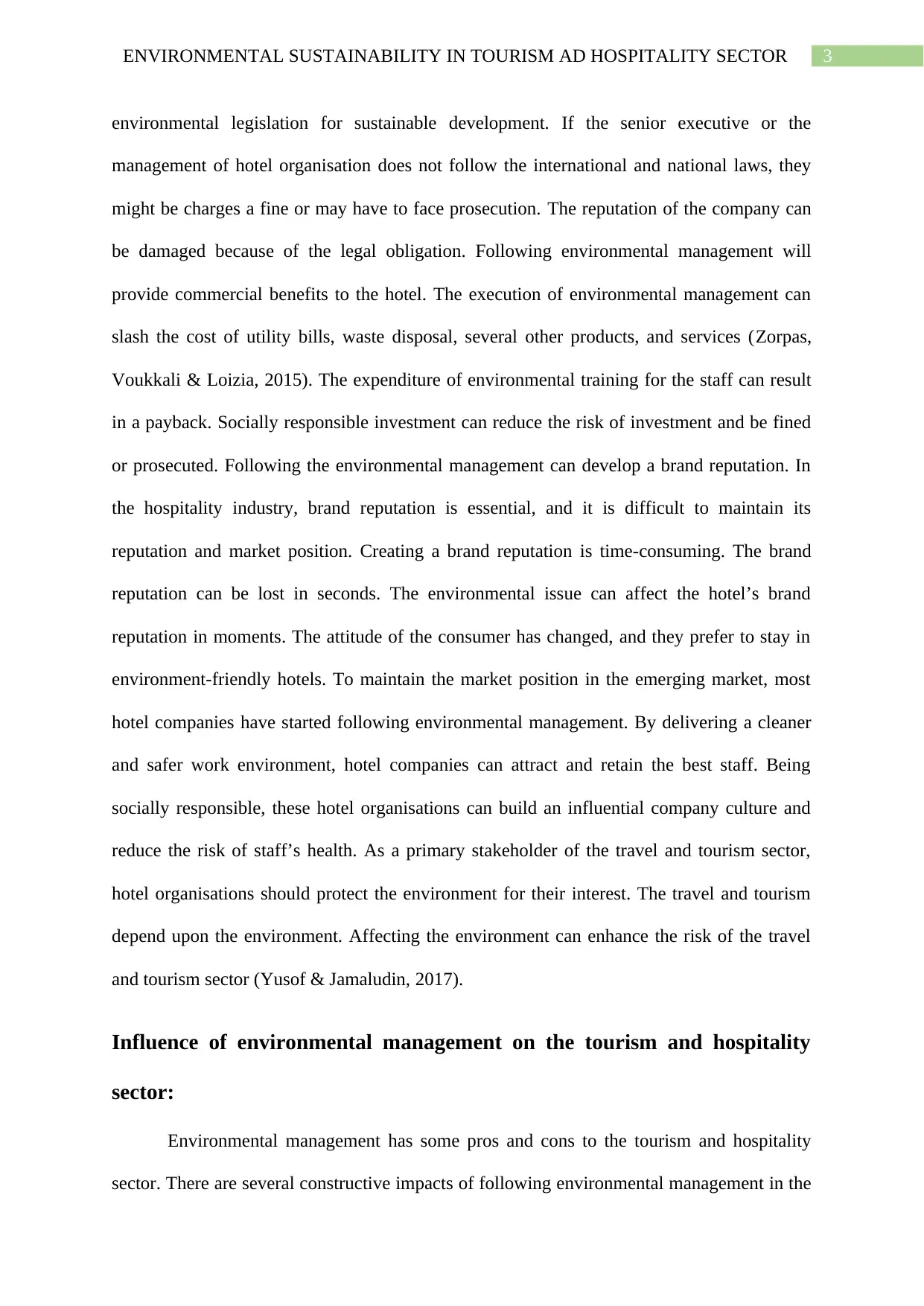
3ENVIRONMENTAL SUSTAINABILITY IN TOURISM AD HOSPITALITY SECTOR
environmental legislation for sustainable development. If the senior executive or the
management of hotel organisation does not follow the international and national laws, they
might be charges a fine or may have to face prosecution. The reputation of the company can
be damaged because of the legal obligation. Following environmental management will
provide commercial benefits to the hotel. The execution of environmental management can
slash the cost of utility bills, waste disposal, several other products, and services (Zorpas,
Voukkali & Loizia, 2015). The expenditure of environmental training for the staff can result
in a payback. Socially responsible investment can reduce the risk of investment and be fined
or prosecuted. Following the environmental management can develop a brand reputation. In
the hospitality industry, brand reputation is essential, and it is difficult to maintain its
reputation and market position. Creating a brand reputation is time-consuming. The brand
reputation can be lost in seconds. The environmental issue can affect the hotel’s brand
reputation in moments. The attitude of the consumer has changed, and they prefer to stay in
environment-friendly hotels. To maintain the market position in the emerging market, most
hotel companies have started following environmental management. By delivering a cleaner
and safer work environment, hotel companies can attract and retain the best staff. Being
socially responsible, these hotel organisations can build an influential company culture and
reduce the risk of staff’s health. As a primary stakeholder of the travel and tourism sector,
hotel organisations should protect the environment for their interest. The travel and tourism
depend upon the environment. Affecting the environment can enhance the risk of the travel
and tourism sector (Yusof & Jamaludin, 2017).
Influence of environmental management on the tourism and hospitality
sector:
Environmental management has some pros and cons to the tourism and hospitality
sector. There are several constructive impacts of following environmental management in the
environmental legislation for sustainable development. If the senior executive or the
management of hotel organisation does not follow the international and national laws, they
might be charges a fine or may have to face prosecution. The reputation of the company can
be damaged because of the legal obligation. Following environmental management will
provide commercial benefits to the hotel. The execution of environmental management can
slash the cost of utility bills, waste disposal, several other products, and services (Zorpas,
Voukkali & Loizia, 2015). The expenditure of environmental training for the staff can result
in a payback. Socially responsible investment can reduce the risk of investment and be fined
or prosecuted. Following the environmental management can develop a brand reputation. In
the hospitality industry, brand reputation is essential, and it is difficult to maintain its
reputation and market position. Creating a brand reputation is time-consuming. The brand
reputation can be lost in seconds. The environmental issue can affect the hotel’s brand
reputation in moments. The attitude of the consumer has changed, and they prefer to stay in
environment-friendly hotels. To maintain the market position in the emerging market, most
hotel companies have started following environmental management. By delivering a cleaner
and safer work environment, hotel companies can attract and retain the best staff. Being
socially responsible, these hotel organisations can build an influential company culture and
reduce the risk of staff’s health. As a primary stakeholder of the travel and tourism sector,
hotel organisations should protect the environment for their interest. The travel and tourism
depend upon the environment. Affecting the environment can enhance the risk of the travel
and tourism sector (Yusof & Jamaludin, 2017).
Influence of environmental management on the tourism and hospitality
sector:
Environmental management has some pros and cons to the tourism and hospitality
sector. There are several constructive impacts of following environmental management in the
Paraphrase This Document
Need a fresh take? Get an instant paraphrase of this document with our AI Paraphraser
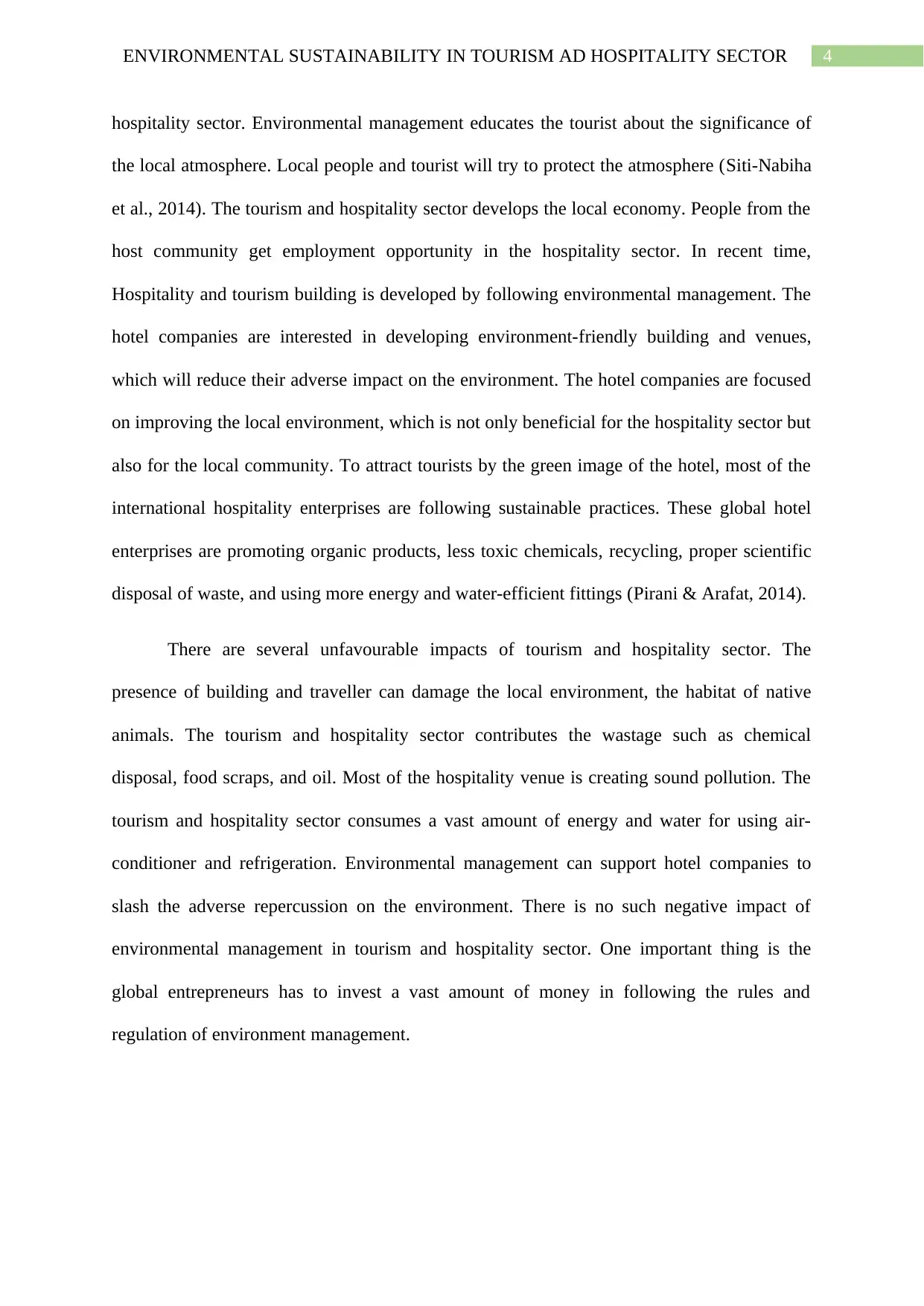
4ENVIRONMENTAL SUSTAINABILITY IN TOURISM AD HOSPITALITY SECTOR
hospitality sector. Environmental management educates the tourist about the significance of
the local atmosphere. Local people and tourist will try to protect the atmosphere (Siti-Nabiha
et al., 2014). The tourism and hospitality sector develops the local economy. People from the
host community get employment opportunity in the hospitality sector. In recent time,
Hospitality and tourism building is developed by following environmental management. The
hotel companies are interested in developing environment-friendly building and venues,
which will reduce their adverse impact on the environment. The hotel companies are focused
on improving the local environment, which is not only beneficial for the hospitality sector but
also for the local community. To attract tourists by the green image of the hotel, most of the
international hospitality enterprises are following sustainable practices. These global hotel
enterprises are promoting organic products, less toxic chemicals, recycling, proper scientific
disposal of waste, and using more energy and water-efficient fittings (Pirani & Arafat, 2014).
There are several unfavourable impacts of tourism and hospitality sector. The
presence of building and traveller can damage the local environment, the habitat of native
animals. The tourism and hospitality sector contributes the wastage such as chemical
disposal, food scraps, and oil. Most of the hospitality venue is creating sound pollution. The
tourism and hospitality sector consumes a vast amount of energy and water for using air-
conditioner and refrigeration. Environmental management can support hotel companies to
slash the adverse repercussion on the environment. There is no such negative impact of
environmental management in tourism and hospitality sector. One important thing is the
global entrepreneurs has to invest a vast amount of money in following the rules and
regulation of environment management.
hospitality sector. Environmental management educates the tourist about the significance of
the local atmosphere. Local people and tourist will try to protect the atmosphere (Siti-Nabiha
et al., 2014). The tourism and hospitality sector develops the local economy. People from the
host community get employment opportunity in the hospitality sector. In recent time,
Hospitality and tourism building is developed by following environmental management. The
hotel companies are interested in developing environment-friendly building and venues,
which will reduce their adverse impact on the environment. The hotel companies are focused
on improving the local environment, which is not only beneficial for the hospitality sector but
also for the local community. To attract tourists by the green image of the hotel, most of the
international hospitality enterprises are following sustainable practices. These global hotel
enterprises are promoting organic products, less toxic chemicals, recycling, proper scientific
disposal of waste, and using more energy and water-efficient fittings (Pirani & Arafat, 2014).
There are several unfavourable impacts of tourism and hospitality sector. The
presence of building and traveller can damage the local environment, the habitat of native
animals. The tourism and hospitality sector contributes the wastage such as chemical
disposal, food scraps, and oil. Most of the hospitality venue is creating sound pollution. The
tourism and hospitality sector consumes a vast amount of energy and water for using air-
conditioner and refrigeration. Environmental management can support hotel companies to
slash the adverse repercussion on the environment. There is no such negative impact of
environmental management in tourism and hospitality sector. One important thing is the
global entrepreneurs has to invest a vast amount of money in following the rules and
regulation of environment management.
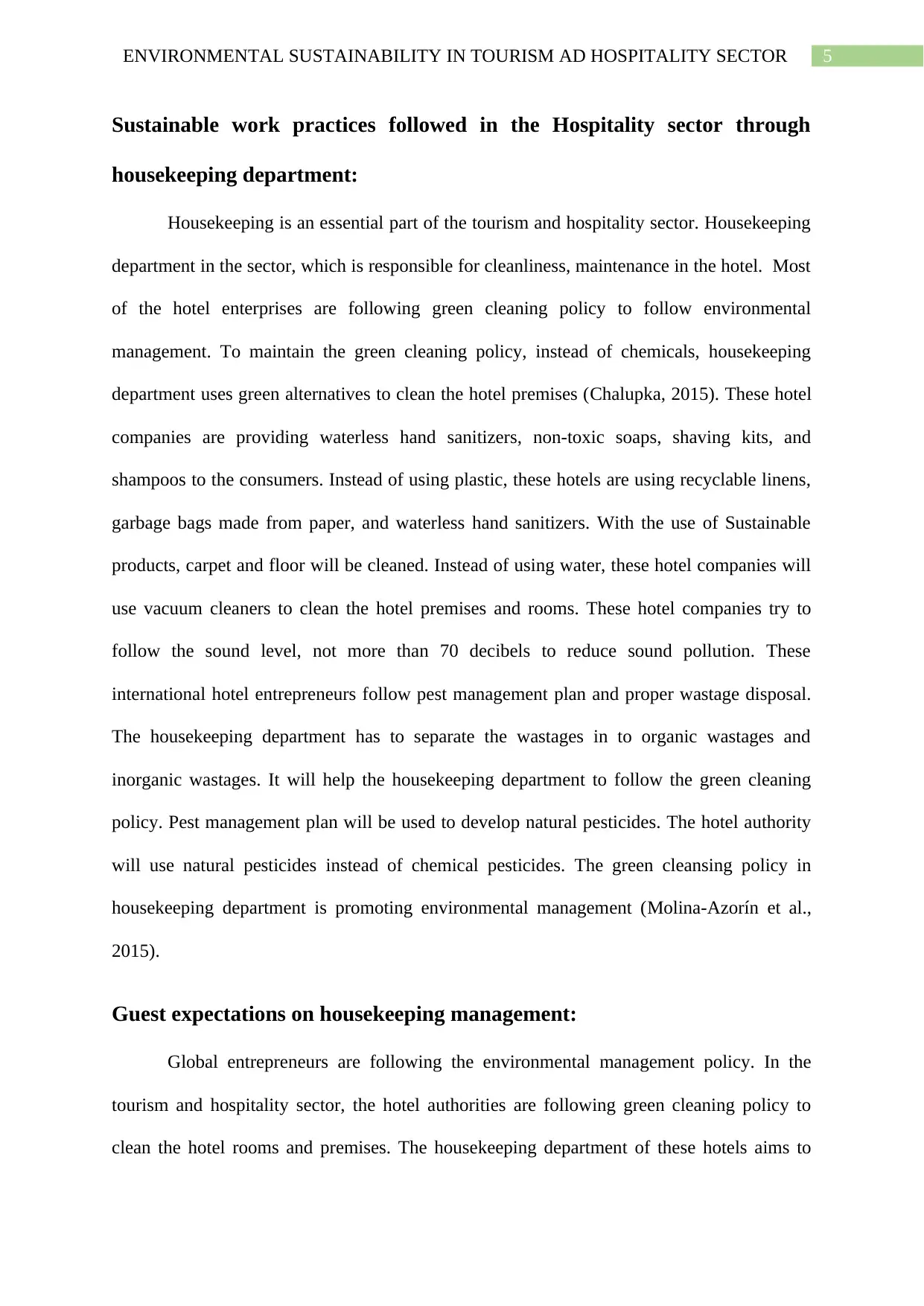
5ENVIRONMENTAL SUSTAINABILITY IN TOURISM AD HOSPITALITY SECTOR
Sustainable work practices followed in the Hospitality sector through
housekeeping department:
Housekeeping is an essential part of the tourism and hospitality sector. Housekeeping
department in the sector, which is responsible for cleanliness, maintenance in the hotel. Most
of the hotel enterprises are following green cleaning policy to follow environmental
management. To maintain the green cleaning policy, instead of chemicals, housekeeping
department uses green alternatives to clean the hotel premises (Chalupka, 2015). These hotel
companies are providing waterless hand sanitizers, non-toxic soaps, shaving kits, and
shampoos to the consumers. Instead of using plastic, these hotels are using recyclable linens,
garbage bags made from paper, and waterless hand sanitizers. With the use of Sustainable
products, carpet and floor will be cleaned. Instead of using water, these hotel companies will
use vacuum cleaners to clean the hotel premises and rooms. These hotel companies try to
follow the sound level, not more than 70 decibels to reduce sound pollution. These
international hotel entrepreneurs follow pest management plan and proper wastage disposal.
The housekeeping department has to separate the wastages in to organic wastages and
inorganic wastages. It will help the housekeeping department to follow the green cleaning
policy. Pest management plan will be used to develop natural pesticides. The hotel authority
will use natural pesticides instead of chemical pesticides. The green cleansing policy in
housekeeping department is promoting environmental management (Molina-Azorín et al.,
2015).
Guest expectations on housekeeping management:
Global entrepreneurs are following the environmental management policy. In the
tourism and hospitality sector, the hotel authorities are following green cleaning policy to
clean the hotel rooms and premises. The housekeeping department of these hotels aims to
Sustainable work practices followed in the Hospitality sector through
housekeeping department:
Housekeeping is an essential part of the tourism and hospitality sector. Housekeeping
department in the sector, which is responsible for cleanliness, maintenance in the hotel. Most
of the hotel enterprises are following green cleaning policy to follow environmental
management. To maintain the green cleaning policy, instead of chemicals, housekeeping
department uses green alternatives to clean the hotel premises (Chalupka, 2015). These hotel
companies are providing waterless hand sanitizers, non-toxic soaps, shaving kits, and
shampoos to the consumers. Instead of using plastic, these hotels are using recyclable linens,
garbage bags made from paper, and waterless hand sanitizers. With the use of Sustainable
products, carpet and floor will be cleaned. Instead of using water, these hotel companies will
use vacuum cleaners to clean the hotel premises and rooms. These hotel companies try to
follow the sound level, not more than 70 decibels to reduce sound pollution. These
international hotel entrepreneurs follow pest management plan and proper wastage disposal.
The housekeeping department has to separate the wastages in to organic wastages and
inorganic wastages. It will help the housekeeping department to follow the green cleaning
policy. Pest management plan will be used to develop natural pesticides. The hotel authority
will use natural pesticides instead of chemical pesticides. The green cleansing policy in
housekeeping department is promoting environmental management (Molina-Azorín et al.,
2015).
Guest expectations on housekeeping management:
Global entrepreneurs are following the environmental management policy. In the
tourism and hospitality sector, the hotel authorities are following green cleaning policy to
clean the hotel rooms and premises. The housekeeping department of these hotels aims to
⊘ This is a preview!⊘
Do you want full access?
Subscribe today to unlock all pages.

Trusted by 1+ million students worldwide
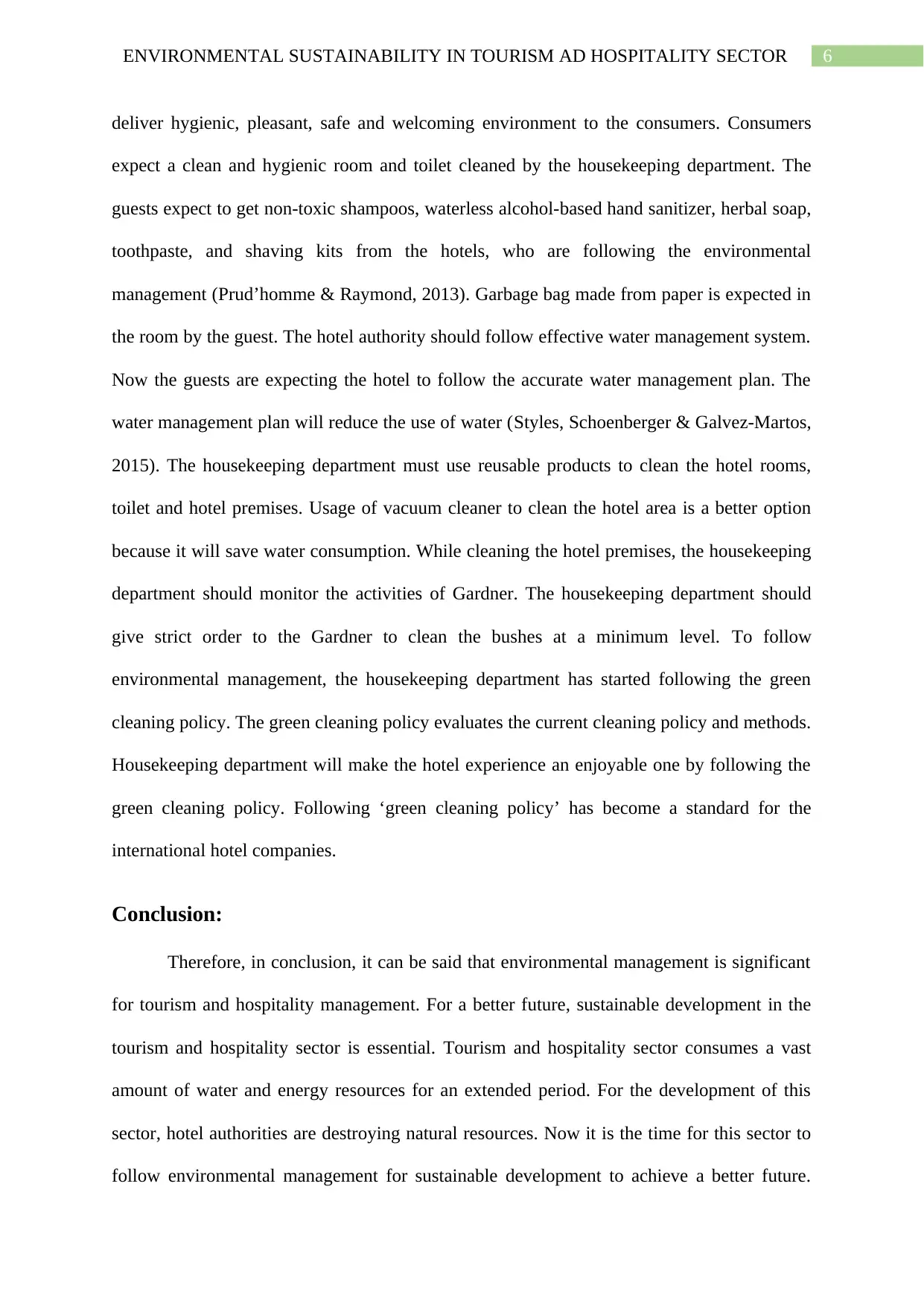
6ENVIRONMENTAL SUSTAINABILITY IN TOURISM AD HOSPITALITY SECTOR
deliver hygienic, pleasant, safe and welcoming environment to the consumers. Consumers
expect a clean and hygienic room and toilet cleaned by the housekeeping department. The
guests expect to get non-toxic shampoos, waterless alcohol-based hand sanitizer, herbal soap,
toothpaste, and shaving kits from the hotels, who are following the environmental
management (Prud’homme & Raymond, 2013). Garbage bag made from paper is expected in
the room by the guest. The hotel authority should follow effective water management system.
Now the guests are expecting the hotel to follow the accurate water management plan. The
water management plan will reduce the use of water (Styles, Schoenberger & Galvez-Martos,
2015). The housekeeping department must use reusable products to clean the hotel rooms,
toilet and hotel premises. Usage of vacuum cleaner to clean the hotel area is a better option
because it will save water consumption. While cleaning the hotel premises, the housekeeping
department should monitor the activities of Gardner. The housekeeping department should
give strict order to the Gardner to clean the bushes at a minimum level. To follow
environmental management, the housekeeping department has started following the green
cleaning policy. The green cleaning policy evaluates the current cleaning policy and methods.
Housekeeping department will make the hotel experience an enjoyable one by following the
green cleaning policy. Following ‘green cleaning policy’ has become a standard for the
international hotel companies.
Conclusion:
Therefore, in conclusion, it can be said that environmental management is significant
for tourism and hospitality management. For a better future, sustainable development in the
tourism and hospitality sector is essential. Tourism and hospitality sector consumes a vast
amount of water and energy resources for an extended period. For the development of this
sector, hotel authorities are destroying natural resources. Now it is the time for this sector to
follow environmental management for sustainable development to achieve a better future.
deliver hygienic, pleasant, safe and welcoming environment to the consumers. Consumers
expect a clean and hygienic room and toilet cleaned by the housekeeping department. The
guests expect to get non-toxic shampoos, waterless alcohol-based hand sanitizer, herbal soap,
toothpaste, and shaving kits from the hotels, who are following the environmental
management (Prud’homme & Raymond, 2013). Garbage bag made from paper is expected in
the room by the guest. The hotel authority should follow effective water management system.
Now the guests are expecting the hotel to follow the accurate water management plan. The
water management plan will reduce the use of water (Styles, Schoenberger & Galvez-Martos,
2015). The housekeeping department must use reusable products to clean the hotel rooms,
toilet and hotel premises. Usage of vacuum cleaner to clean the hotel area is a better option
because it will save water consumption. While cleaning the hotel premises, the housekeeping
department should monitor the activities of Gardner. The housekeeping department should
give strict order to the Gardner to clean the bushes at a minimum level. To follow
environmental management, the housekeeping department has started following the green
cleaning policy. The green cleaning policy evaluates the current cleaning policy and methods.
Housekeeping department will make the hotel experience an enjoyable one by following the
green cleaning policy. Following ‘green cleaning policy’ has become a standard for the
international hotel companies.
Conclusion:
Therefore, in conclusion, it can be said that environmental management is significant
for tourism and hospitality management. For a better future, sustainable development in the
tourism and hospitality sector is essential. Tourism and hospitality sector consumes a vast
amount of water and energy resources for an extended period. For the development of this
sector, hotel authorities are destroying natural resources. Now it is the time for this sector to
follow environmental management for sustainable development to achieve a better future.
Paraphrase This Document
Need a fresh take? Get an instant paraphrase of this document with our AI Paraphraser
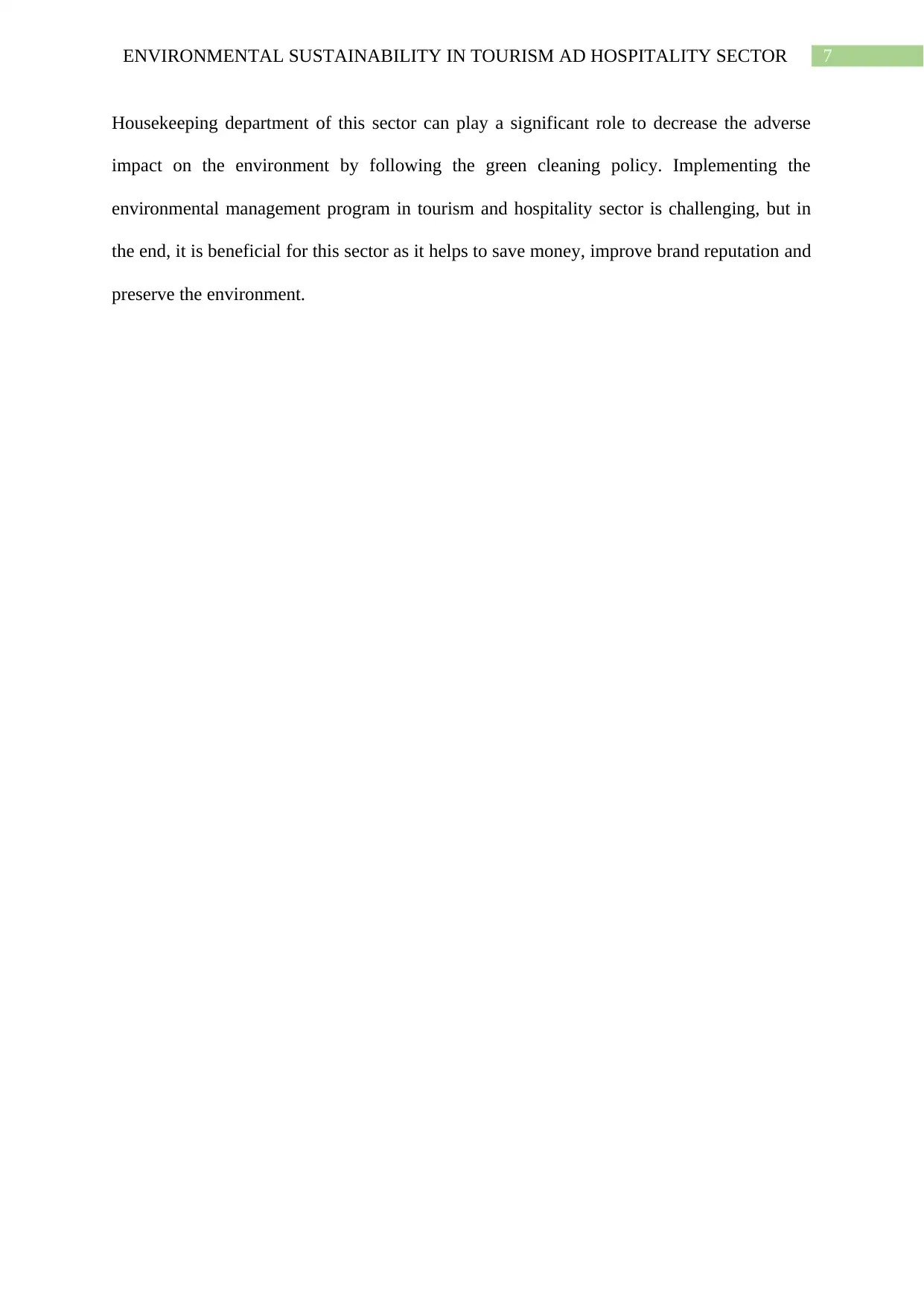
7ENVIRONMENTAL SUSTAINABILITY IN TOURISM AD HOSPITALITY SECTOR
Housekeeping department of this sector can play a significant role to decrease the adverse
impact on the environment by following the green cleaning policy. Implementing the
environmental management program in tourism and hospitality sector is challenging, but in
the end, it is beneficial for this sector as it helps to save money, improve brand reputation and
preserve the environment.
Housekeeping department of this sector can play a significant role to decrease the adverse
impact on the environment by following the green cleaning policy. Implementing the
environmental management program in tourism and hospitality sector is challenging, but in
the end, it is beneficial for this sector as it helps to save money, improve brand reputation and
preserve the environment.
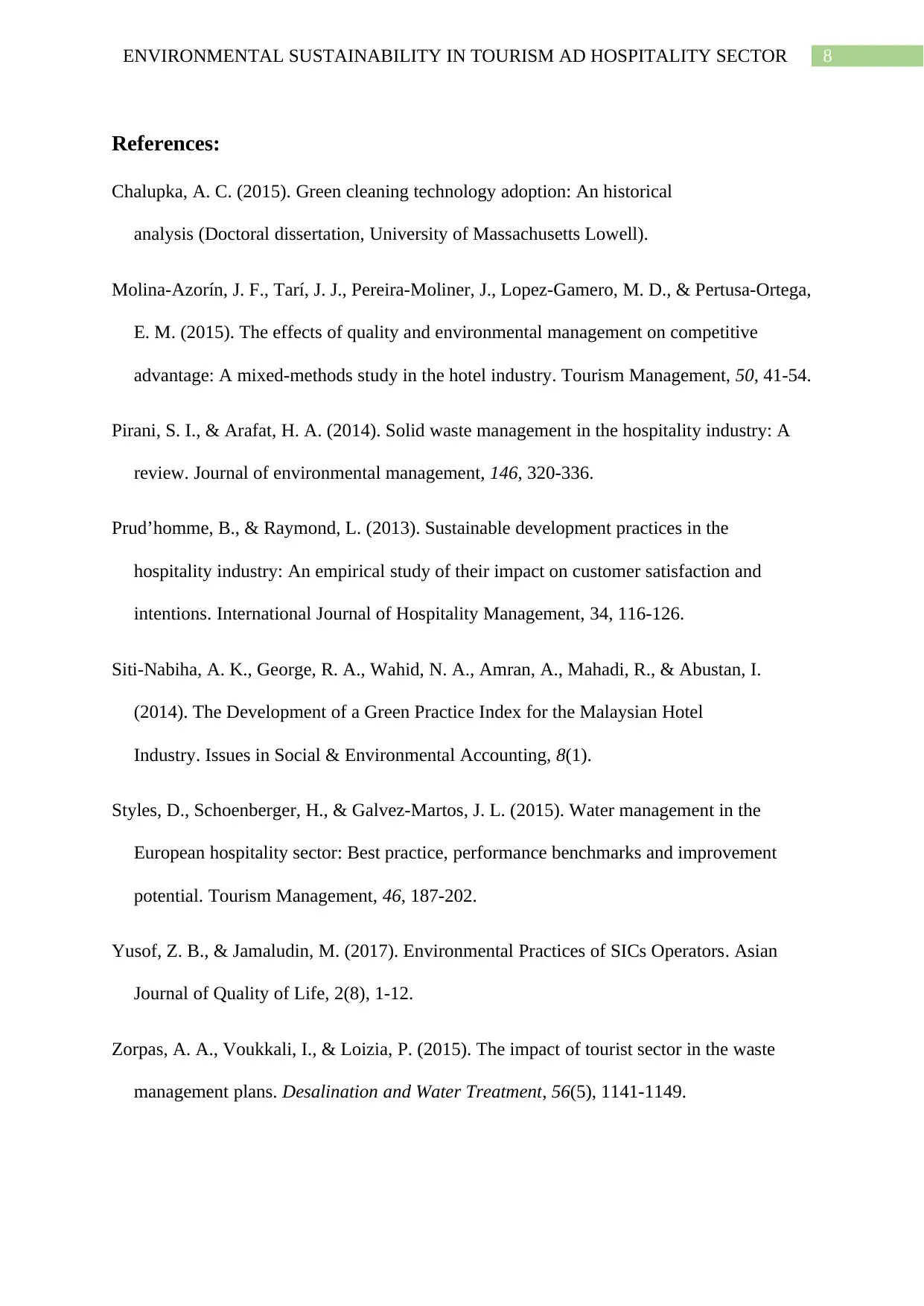
8ENVIRONMENTAL SUSTAINABILITY IN TOURISM AD HOSPITALITY SECTOR
References:
Chalupka, A. C. (2015). Green cleaning technology adoption: An historical
analysis (Doctoral dissertation, University of Massachusetts Lowell).
Molina-Azorín, J. F., Tarí, J. J., Pereira-Moliner, J., Lopez-Gamero, M. D., & Pertusa-Ortega,
E. M. (2015). The effects of quality and environmental management on competitive
advantage: A mixed-methods study in the hotel industry. Tourism Management, 50, 41-54.
Pirani, S. I., & Arafat, H. A. (2014). Solid waste management in the hospitality industry: A
review. Journal of environmental management, 146, 320-336.
Prud’homme, B., & Raymond, L. (2013). Sustainable development practices in the
hospitality industry: An empirical study of their impact on customer satisfaction and
intentions. International Journal of Hospitality Management, 34, 116-126.
Siti-Nabiha, A. K., George, R. A., Wahid, N. A., Amran, A., Mahadi, R., & Abustan, I.
(2014). The Development of a Green Practice Index for the Malaysian Hotel
Industry. Issues in Social & Environmental Accounting, 8(1).
Styles, D., Schoenberger, H., & Galvez-Martos, J. L. (2015). Water management in the
European hospitality sector: Best practice, performance benchmarks and improvement
potential. Tourism Management, 46, 187-202.
Yusof, Z. B., & Jamaludin, M. (2017). Environmental Practices of SICs Operators. Asian
Journal of Quality of Life, 2(8), 1-12.
Zorpas, A. A., Voukkali, I., & Loizia, P. (2015). The impact of tourist sector in the waste
management plans. Desalination and Water Treatment, 56(5), 1141-1149.
References:
Chalupka, A. C. (2015). Green cleaning technology adoption: An historical
analysis (Doctoral dissertation, University of Massachusetts Lowell).
Molina-Azorín, J. F., Tarí, J. J., Pereira-Moliner, J., Lopez-Gamero, M. D., & Pertusa-Ortega,
E. M. (2015). The effects of quality and environmental management on competitive
advantage: A mixed-methods study in the hotel industry. Tourism Management, 50, 41-54.
Pirani, S. I., & Arafat, H. A. (2014). Solid waste management in the hospitality industry: A
review. Journal of environmental management, 146, 320-336.
Prud’homme, B., & Raymond, L. (2013). Sustainable development practices in the
hospitality industry: An empirical study of their impact on customer satisfaction and
intentions. International Journal of Hospitality Management, 34, 116-126.
Siti-Nabiha, A. K., George, R. A., Wahid, N. A., Amran, A., Mahadi, R., & Abustan, I.
(2014). The Development of a Green Practice Index for the Malaysian Hotel
Industry. Issues in Social & Environmental Accounting, 8(1).
Styles, D., Schoenberger, H., & Galvez-Martos, J. L. (2015). Water management in the
European hospitality sector: Best practice, performance benchmarks and improvement
potential. Tourism Management, 46, 187-202.
Yusof, Z. B., & Jamaludin, M. (2017). Environmental Practices of SICs Operators. Asian
Journal of Quality of Life, 2(8), 1-12.
Zorpas, A. A., Voukkali, I., & Loizia, P. (2015). The impact of tourist sector in the waste
management plans. Desalination and Water Treatment, 56(5), 1141-1149.
⊘ This is a preview!⊘
Do you want full access?
Subscribe today to unlock all pages.

Trusted by 1+ million students worldwide

9ENVIRONMENTAL SUSTAINABILITY IN TOURISM AD HOSPITALITY SECTOR
1 out of 10
Related Documents
Your All-in-One AI-Powered Toolkit for Academic Success.
+13062052269
info@desklib.com
Available 24*7 on WhatsApp / Email
![[object Object]](/_next/static/media/star-bottom.7253800d.svg)
Unlock your academic potential
Copyright © 2020–2026 A2Z Services. All Rights Reserved. Developed and managed by ZUCOL.





